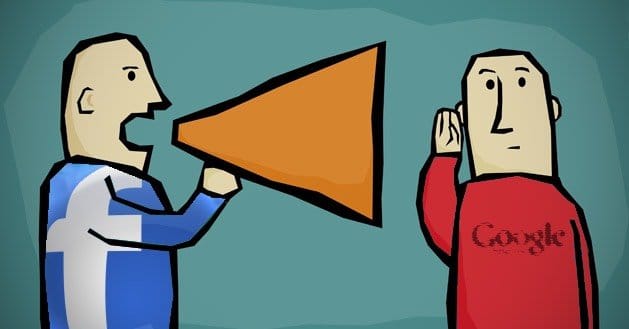 Written by ContentPowered.com
Written by ContentPowered.com
Have you noticed an influx of ads lately when surfing the Internet, viewing YouTube, or browsing your Facebook wall? Ads seem to pop up much more frequently and are curiously targeting your interests and recent searched items. If you are in the business of marketing, you have definitely taken notice of this phenomenon.
Introduction to Facebook Ads and Adwords
Two internet advertising giants, Facebook and Google, are competing for business ads. Google uses Google AdWords to link searchers to websites with the use of searchable keywords. Facebook Ads are displayed on relevant pages with the intent of building brand awareness and visibility. These advertising gurus have taken the guesswork out of advertising. Instead of guessing which audience to target or when to run an ad, Google and Facebook do the work for you by strategically tracking every click and like users make.
By tracking where users have been and what they are interested in, audiences for specific businesses are easily targeted and increased. As a result, businesses are vesting more time, money, and energies into online marketing. Google has been the leading virtual ad market for quite a while now. It continues to forge forward with its Google AdWords; however, Facebook is becoming a strong contender with its launched Facebook Ads.
Now there are two internet marketing platforms to choose from. Businesses are trying to decide which is the better market for ads? Do the ads work in the same way? Is one really better than the other? Is it advantageous to use both for business promotion? How do the two compare?
Similarities
Both Google Adwords and Facebook both have massive audiences to market ads to. They both offer paid ad options as well as free online marketing options found on Google+ Business Pages and Facebook Fan pages. For businesses just starting out, these free online marketing tools are a great way to promote products and services and to establish a brand.
Both media giants make money from advertising in online platforms which have global reach. Facebook Ads and Google Adwords share a common function to build site traffic and attract business. To accomplish this, they both use targeted marketing based on user data. Advertisers only pay when their ads are acted upon either by click (CPC) or number of impressions (CPM).
Differences
Advertising with Google and Facebook is a matter of different approaches taken. The approach taken is driven by specific business goals. If the goal of the business is to make a brand known and more visible, then the Facebook social media approach should be taken. On the other hand, if the goal of the business is to sell a specific service or product, Google Adwords is the approach to take. People looking for specific solutions to a problem will use search engines. They will search by entering in keywords or phrases. Google Adwords is also the approach to take if a business is interested in increasing conversion rates.
Facebook has the advantage of access to personal information in regard to favorites in movies, books, travels, music, and television shows. This information helps businesses target specific audiences. Google is gaining an edge on Facebook with its Google+ feature which connects users with others who share the same social groups and interests. The advantage Google+ has over Facebook here is connecting with users who are surfing the internet, checking emails, and staying logged in.
Which is best for you?

The biggest difference between Facebook Ads and Google AdWords is where the ads are actually seen and how it is determined if an ad is displayed at all. Google Adwords appear in Google Properties such as SERP’s and YouTube. They are displayed whenever a keyword is entered into a search. A majority of ads placed with Google Adwords appear on Google Properties such as SERP’s and YouTube. In contrast, Facebook Ads are more static and always appear in the same place. This static context limits the scope and size of the marketed audience.
Google’s advantages
Google is leading the way with advertising options. Google goes way beyond the limited traditional ad display types available with Facebook. The Google Display Network allows businesses to choose the best type of display to represent their business and to target a specific audience. With Google, ads can target specific geographic populations. Remarketing is another featured possible only with Google. This remarketing feature allows businesses to follow users and retarget followers based on their history of browsing its business site and partner business sites.
Facebook and Google markets also differ in how they target audiences. Facebook specifically targets users based on their likes, interests, geographic, and demographic information. For years, businesses have benefited from “word of mouth” advertising. Facebook has revolutionized “word of mouth” advertising with the share feature and simply people talking about what they saw on Facebook. The share feature is what motivates fans to stop what they are doing on Facebook and click on an ad being shared by many of their friends. The image feature of Facebook Ads imprints an impression on users’ memories often leading to later business traffic when the ad is recalled in conversations or searches. The success of Facebook Ads is built on friends influencing friends to try and use products. The process is slow, but effective.
Facebook’s advantages
With Facebook, businesses choose the audience they wish to target based on age, gender, location, education, relationship status, work, travels, and social connections. This is great if businesses have a specific group in mind and have the time to grow their audience. Facebook gradually builds a brand over time as ads are seen over and over and eventually lead to activity on the business site. Brands are built much faster using Google’s keywords which link searchers to articles, blogs, and ads using those keywords. This targeting system could miss out on new markets Google is able to target through key word links to ads. Google doesn’t filter ads based on user profiles. Instead, Google reaches followers who click on specific search terms. Keywords link users to sites and ads.
Which one is better for a business? This comparison shows the advantages both can have on business growth. A blended approach of the two can give the advantage of both short-term and long-term marketing achievement. The more important thing is to just get started with either Google Adwords or Facebook Ads and start attracting attention to the business. People will investigate what interests them. Whether a business chooses Google Adwords or Facebook Ads, it needs to hook their audience with interesting ad, blog, and article messages.

